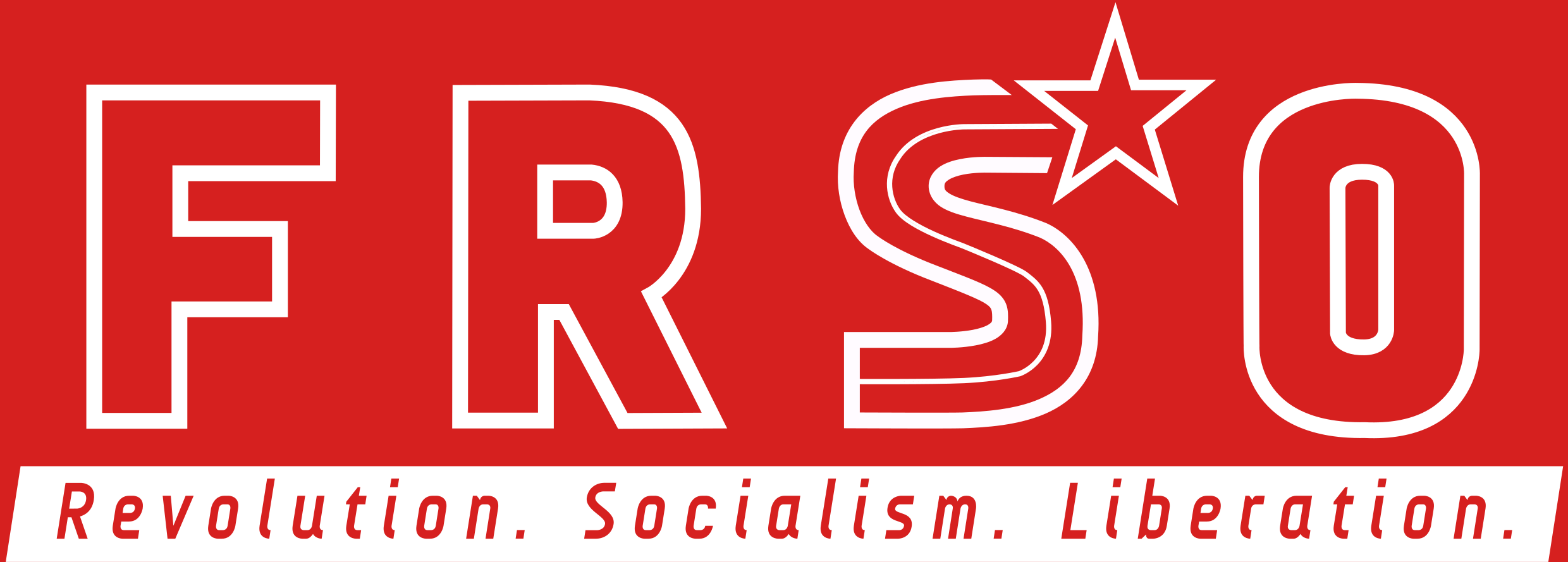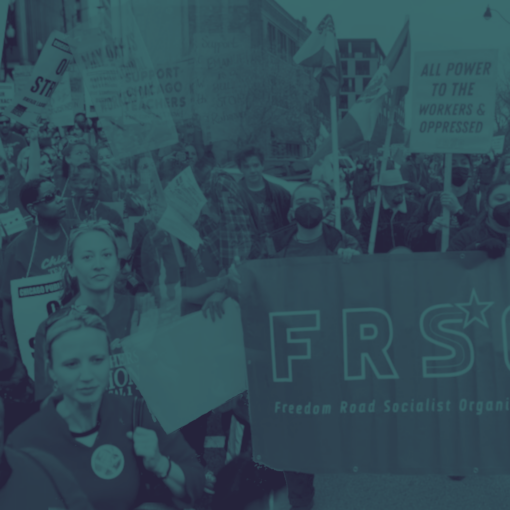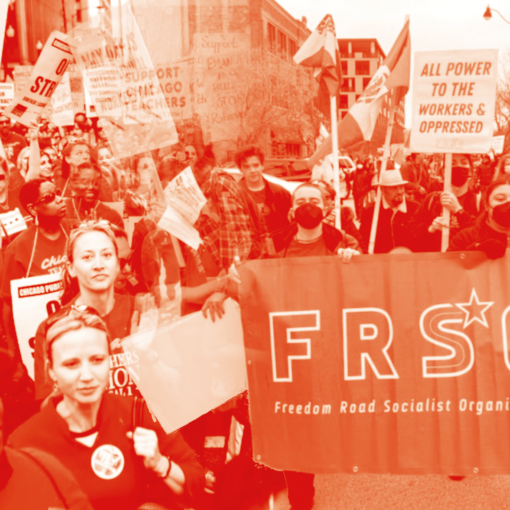The struggles of colonized, indigenous, and oppressed nationality peoples have been part and parcel of the peoples’ struggle against U.S. imperialism. Historically, these struggles, and in particular the African American liberation movement, have dealt blows against the system, and won reforms that benefited the working masses.
In this spirit of struggle and unity, the FRSO puts forward the following immediate demands: 1. Independence for Puerto Rico and other colonies of the United States! The United States has kept Puerto Rico, the Virgin Islands, American Samoa, Belau (Palau), Guam, the Marshall Islands, and the Northern Mariana Islands as colonies. They have no political representation in the United States, and their countries are exploited by U.S. multinational corporations and by the U.S. military. The FRSO supports:- Immediate independence for all colonies of the United States. The United States must recognize and honor all previous commitments (Social Security, Medicare, veterans benefits, etc.) made to residents of colonies, provide economic aid, and allow unrestricted immigration during a transition period.
- Withdrawal of all U.S. military bases from all colonies of the United States and an end to military recruitment.
- Observance of a nuclear-free zone in the Pacific and free healthcare and reparations for all Pacific Islanders affected by U.S. nuclear tests
- Full sovereignty for Alaskan Natives, Native Americans, and Native Hawaiians. This includes upholding past treaties and abolishing the Bureau of Indian Affairs, and the exercise of local political power.
- The right to national development. In the current period, this includes gaming and especially the return of indigenous peoples’ land and natural resources to make their sovereign areas economically viable.
- Protection for indigenous peoples’ traditions and culture, including full equality of languages, support for indigenous education, and an end to stereotyping and exploitation of their culture.
- i) The British settlers in North America killed the indigenous peoples and enslaved Africans to work in the plantations in the South. This period of slavery, and later Jim Crow segregation forged the many African peoples brought to the United States into a common people with a shared culture and language and a common economy based on agriculture in the Black Belt South. Former slaves, promised 40 acres and a mule following the Civil War, were forced to work as sharecroppers. Those African Americans who did manage to become farmers have by and large been dispossessed of their land. Despite great migration of African Americans to the north and west, and economic development in the South, the majority of African Americans still live in the South, which maintains a distinct economy based on low-wage, non-union, and less educated labor. African Americans in the South continue as a nation oppressed by U.S. imperialism, and have the right to self-determination.
- ii) In 1836, American settlers in Texas revolted against Mexico and nine years later the United States annexed Texas. In 1848, the United States attacked Mexico and seized what is now the states of Arizona, California, Colorado, Nevada, New Mexico, and Utah. In this area of the southwest (including Texas), the United States seized the land of the Mexicans, banned them from independent mining, segregated their children in schools, and suppressed their language, forcing them and millions of immigrants from Mexico to work as laborers in the mines, fields, and factories of the Southwest. These peoples were forged into a Chicano (Mexican-American) nation with a common territory, culture, and economy who have the right to self-determination.
- iii) In 1893, the United States backed the overthrow of the Kingdom of Hawai’i and five years later colonized the island. During the years as a U.S. colony, Hawai’i developed an economy based on sugar plantations on land taken from the Native Hawaiians, a language (Pidgin) and culture (Local) based on the working masses of the islands made up of Native Hawaiian, Japanese, Chinese, Filipinos, Koreans, Puerto Ricans, and Portuguese. As a nation with a common territory, economy, and culture, that has been seized and exploited by U.S. imperialism, the people of Hawai’i have the right to self-determination.
- i) African Americans both inside and outside of the South consist of the descendants of slaves as well as many descendants of immigrants of African descent. While most descendants of English-speaking immigrants from Africa and the Caribbean are assimilating into the African American community, other immigrants, such as Haitians and Somalis, are forming distinct communities. In addition to supporting the right to self-determination for the African American nation, the FRSO supports the following immediate demands:
- Reparations for the descendants of African slaves in the United States
- Political power through regional and local autonomy for communities of African Americans outside of the African American nation. End gerrymandering of political districts that reduce African American political representation.
- An end to the war on drugs targeting the African American community, police brutality, killer cops, and all-white juries.
- Expansion of affirmative action programs and an end to discriminatory testing and entrance requirements for colleges.
- Increase funding for schools in African American communities
- Political asylum for African and Caribbean people fleeing repressive governments.
- ii) Asian Americans (Chinese, Filipino, Indian, Korean, Japanese, Vietnamese, Lao, Hmong, and others) from east, southeast, and south Asia have distinct communities, and at the same time many Asian Americans are undergoing a process of amalgamation and intermarriage. Recognizing the particular character of each nationality, the FRSO supports the common demands of Asian Americans such as:
- Full equality of languages in voting, schools, and government services. Expansion of bilingual education programs
- End to discriminatory immigration practices and licensing laws for professionals. End deportations for all Asian American immigrants. Full equality for undocumented immigrants and non-citizens in access to all government benefits and services, such as healthcare and welfare.
- Stop the persecution of Chinese Americans who are victimized by the growing U.S. antagonism towards the People’s Republic of China.
- Affirmative action for Asian American nationalities who are underrepresented in colleges and universities such as Filipinos, Vietnamese, Lao, Hmong, etc.
- Political power through regional and local autonomy for Asian American communities in the continental United States. End gerrymandering of political districts that reduce Asian American political representation.
- iii) Arab Americans (Palestinians, Lebanese, Syrian, Jordanians, Iraqis, Egyptians, and others) have distinct communities but face common conditions. Recognizing the particular character of each nationality, the FRSO supports the common demands of Arab Americans such as:
- Full equality of languages in voting, schools, and government services. Expansion of bilingual education programs.
- Full equality for undocumented immigrants and non-citizens in access to all government benefits and services, such as healthcare and welfare.
- Amnesty for undocumented Arab males who were forced to take part in the “special registration” program of the Department of Homeland Security and were immediately placed in deportation proceedings.
- End detentions and deportations and call for legalization for Arab immigrants; and end FBI/DHS harassment of Arab immigrants and non-immigrants.
- Stop the persecution of Arab Americans and American Muslims who are victimized by the U.S. “war on terror.” Defend the right of Arab and all Muslim women to wear a headscarf, especially in schools and the workplace, without harassment.
- Political power through regional and local autonomy for Arab American communities in the continental United States. End gerrymandering of political districts that reduce Arab American political representation.
- iv) The descendants of Spanish and Portuguese-speaking countries of Latin America and the Caribbean have formed distinct communities of Brazilians, Chicanos and Mexicanos, Cubans, Dominicans, Guatemalans, Puerto Ricans, Salvadorans, etc. In areas of the Southwest, there is also some amalgamation and intermarriage between Chicanos and other Latinos. In addition to the upholding the right to self-determination of the Chicano Nation, and recognizing the particular character of each nationality, the FRSO supports the common demands of Chicanos and Latinos including:
- Political power through regional and local autonomy for Chicano and Latino communities outside of the Chicano nation. End gerrymandering of political districts that reduce Chicano and Latino political representation.
- Reparations for the forced deportations of Chicanos in the 1930s.
- An end to ICE raids and militarization of the U.S.-Mexico border. Legal Residency for undocumented immigrants. End all deportations of Latino immigrants. No criminalization of the undocumented. Full equality for undocumented immigrants and non-citizens in access to all government benefits and services, such as healthcare and welfare.
- End the embargo on Cuba and all restrictions on travel and family relations for Cuban Americans going to Cuba.
- An end to police brutality, racial profiling, criminalization, high incarceration rates, and trial by all-white juries.
- Expansion of affirmative action programs and an end to discriminatory testing and entrance requirements for colleges.
- Full equality of languages in voting, schools, and government services. Expansion of bilingual education programs. Local voting and jury rights for resident immigrants.
- v) Pacific Islanders and urbanized Indigenous Peoples consist of Pacific Islanders (Samoans, Tongans, Chamorro, and others), Native Alaskans and Native Hawaiians in the continental United States, and urbanized Native Americans outside of their homelands. Recognizing the particular nature of each people, the FRSO supports the common demands of:
- Full equality of languages in voting, schools, and government services. Expansion of bilingual education programs.
- Political power through local and regional autonomy for Pacific Islanders and indigenous peoples outside of their homeland.
- An end to stereotyping and exploitation of their culture.
- Expansion of affirmative action programs and an end to discriminatory testing and entrance requirements for colleges.
- An end to police brutality, racial profiling, and trial by all-white juries.
- Community meetings should be held on evenings and weekends when more working people can participate.
- Education on the history of oppressed nationalities should emphasize the role of the working masses.
- Community organizations should educate themselves and support struggles affecting other oppressed nationalities and the multi-national working class such as labor, healthcare, welfare, civil liberties, etc.
- Expansion of class-based programs targeting low-income and first generation college students in addition to race-based affirmative action programs.
- Oppressed nationalities should not limit their political participation to electoral politics in general and the Democratic and Republican parties in particular.



